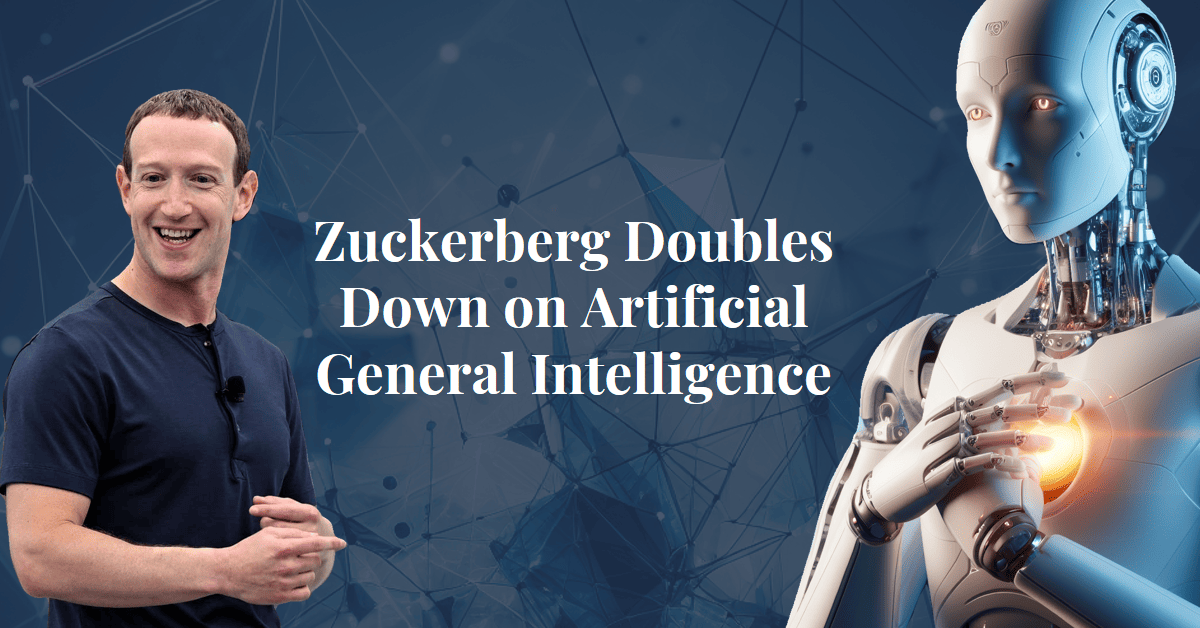Mark Zuckerberg, the ever-ambitious CEO of Meta Platforms, has set his sights on a new frontier: artificial general intelligence (AGI). In a recent announcement, Zuckerberg outlined a major reorganization of Meta’s AI teams, shifting the focus toward building this elusive technology. This bold move places Meta squarely in the heart of a burgeoning race for AGI, pitting it against tech giants like Google, DeepMind, and OpenAI.
As reported by Karissa Behenna for Engadget, Zuckerberg sees AGI as the key to unlocking both the potential of the metaverse and improving everyday life. He envisions a future where virtual worlds are populated by intelligent, lifelike AI characters, and where AI assistants seamlessly assist us in our daily tasks. To achieve this ambitious vision, Meta is merging its two existing AI research teams – the Fundamental AI Research (FAIR) group and the generative AI experiences team – into a single, unified unit. This streamlined structure, Zuckerberg claims, will “accelerate” Meta’s research efforts and bring them closer to their AGI goals.
However, Meta’s pursuit of AGI comes amidst a period of significant internal changes. The company has recently undergone layoffs, shedding over 20,000 jobs since 2022. Against this backdrop, Zuckerberg’s decision to expand the AI team raises questions about resource allocation and priorities.
Despite these concerns, Zuckerberg remains undeterred. He emphasizes that Meta’s commitment to the metaverse remains strong and that AGI research is seen as a critical component of building a truly immersive and connected virtual world. Furthermore, he has pledged to open-source AGI responsibly, ensuring that its benefits are shared by all.
Whether Meta’s ambitious reorganization will bear fruit remains to be seen. The journey towards AGI is fraught with challenges, and success is far from guaranteed. But one thing is clear: Zuckerberg’s bold move marks a significant turning point for Meta, and it signals the growing importance of AI in shaping the future of technology and society.
Top FAQs about Artificial General Intelligence (AGI)
With Mark Zuckerberg joining the race for AGI, this futuristic technology is captivating more minds than ever before. But what exactly is AGI, and why should we care about it? Let’s dive into some frequently asked questions:
1. What is AGI?
Artificial general intelligence, in its simplest form, aims to create machines with the ability to understand and learn as well as humans, if not surpass us. These machines would possess cognitive abilities like reasoning, problem-solving, and adaptability, allowing them to thrive in diverse environments and perform any intellectual task a human could.
2. Are we close to achieving AGI?
Currently, we haven’t cracked the code for true AGI. While existing AI systems excel in specific domains like chess or image recognition, they lack the general intelligence and flexibility that defines AGI. Researchers are making strides, but there’s still a significant gap to bridge.
3. What are the potential benefits of AGI?
The possibilities are numerous! AGI could revolutionize fields like healthcare, education, scientific research, and more. Imagine AI doctors diagnosing diseases with superhuman accuracy, AI teachers personalizing education for every student, or AI scientists accelerating breakthroughs in areas like climate change and space exploration.
4. What are the potential risks of AGI?
The immense power of AGI also comes with risks. Concerns include job displacement, algorithmic bias, and the potential for misuse by malicious actors. Ensuring responsible development and ethical use of AGI is crucial to prevent unintended consequences.
5. How can we ensure AGI is developed safely and ethically?
Openness and collaboration are key. By involving diverse voices in the development process and creating robust ethical frameworks, we can safeguard against potential pitfalls and ensure AGI benefits all of humanity.
Remember, AGI is still in its early stages, and the answers to these questions are constantly evolving. As the field progresses, new insights and challenges will emerge. However, by actively engaging in this conversation, we can help shape the future of AGI and ensure it serves as a force for good in our world.
Original article by Karissa Behenna for Engadget: https://www.engadget.com/mark-zuckerberg-is-the-latest-billionaire-who-wants-to-create-artificial-general-intelligence-210820789.html
